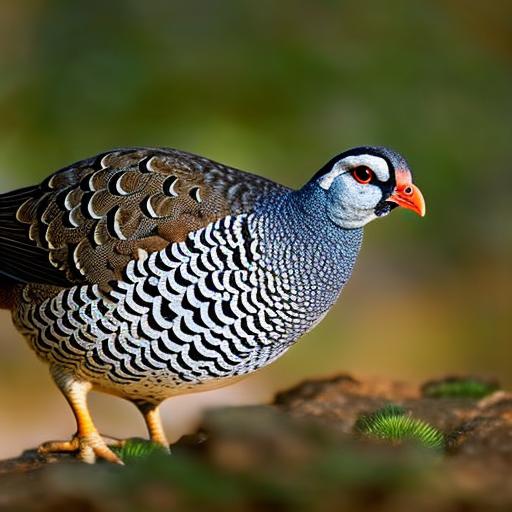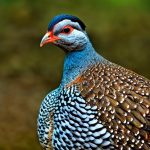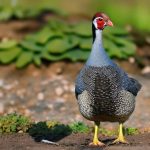Guinea fowl, also known as pintades, are a type of poultry that are native to Africa. They are closely related to other game birds such as pheasants and turkeys. Guinea fowl are known for their distinctive appearance, with speckled feathers and a helmet-like crest on their heads. They are also known for their loud and distinctive calls, which can be heard from a distance. Guinea fowl are popular for their ability to control pests such as ticks, flies, and other insects, making them a valuable addition to any farm or homestead.
Guinea fowl are hardy birds that are well-suited to a variety of climates, including the Australian climate. They are relatively low-maintenance compared to other types of poultry, making them an attractive option for those looking to raise birds for meat, eggs, or pest control. Guinea fowl are also known for their strong flocking instincts, which can make them easier to manage than other types of poultry. Overall, guinea fowl are a unique and valuable addition to any farm or homestead, offering a range of benefits to those who choose to raise them.
Key Takeaways
- Guinea fowl are native to Africa and are known for their insect-eating abilities and loud calls.
- Keeping guinea fowl in Australia can help control pests like ticks and grasshoppers, and their eggs are nutritious.
- Guinea fowl require a secure coop with roosting space and protection from predators.
- A balanced diet for guinea fowl includes grains, seeds, insects, and access to fresh water.
- Breeding guinea fowl requires a suitable nesting area and careful monitoring of the hatching process.
Benefits of Keeping Guinea Fowl in Australia
There are several benefits to keeping guinea fowl in Australia. One of the main benefits is their ability to control pests such as ticks, flies, and other insects. Guinea fowl are natural foragers and will eagerly consume a wide variety of pests, making them an effective and environmentally friendly form of pest control. This can be particularly valuable in Australia, where pests such as ticks can pose a significant threat to livestock and humans.
In addition to their pest control abilities, guinea fowl are also valued for their meat and eggs. Guinea fowl meat is lean and flavorful, making it a popular choice for those looking for a healthy and sustainable source of protein. Guinea fowl eggs are also prized for their rich flavor and nutritional value. In Australia, where there is a growing interest in sustainable and ethical food production, guinea fowl can offer a valuable source of meat and eggs for those looking to raise their own food.
Housing and Care for Guinea Fowl
When it comes to housing and caring for guinea fowl, there are several important considerations to keep in mind. Guinea fowl are hardy birds that are well-suited to a range of climates, but they do require adequate shelter from the elements. A well-ventilated coop or shelter is essential to protect guinea fowl from extreme temperatures and predators. It’s also important to provide plenty of space for guinea fowl to roam and forage, as they are active birds that enjoy exploring their surroundings.
In terms of care, guinea fowl require a balanced diet, access to clean water, and regular health checks. They are relatively low-maintenance compared to other types of poultry, but they do require some attention to ensure their well-being. Providing a balanced diet that includes a mix of commercial feed and fresh greens is important for keeping guinea fowl healthy and productive. Regular health checks can help to identify any potential issues early on and ensure that guinea fowl remain in good condition.
Feeding and Nutrition for Guinea Fowl
Feeding and nutrition are important aspects of caring for guinea fowl. Guinea fowl are natural foragers and will eagerly consume a wide variety of insects, seeds, and greens. In addition to foraging, it’s important to provide guinea fowl with a balanced diet that includes commercial feed specifically formulated for poultry. This feed should be supplemented with fresh greens such as lettuce, kale, and spinach to ensure that guinea fowl receive the vitamins and minerals they need to thrive.
In addition to commercial feed and greens, it’s important to provide guinea fowl with access to clean water at all times. Water is essential for digestion, temperature regulation, and overall health. It’s important to regularly clean and refill water containers to ensure that guinea fowl have access to clean water at all times. By providing a balanced diet that includes commercial feed, fresh greens, and clean water, you can help ensure that your guinea fowl remain healthy and productive.
Breeding and Reproduction of Guinea Fowl
Breeding and reproduction are important considerations for those looking to raise guinea fowl. Guinea fowl are known for their strong flocking instincts and will often form monogamous pairs during the breeding season. They are relatively independent when it comes to breeding and will often seek out secluded areas to build nests and lay eggs. It’s important to provide guinea fowl with suitable nesting areas and privacy during the breeding season to ensure that they have the best chance of successfully hatching and raising their young.
Guinea fowl eggs typically take around 26-28 days to hatch, and once hatched, the chicks will require warmth, protection, and access to food and water. It’s important to provide suitable brooding areas for guinea fowl chicks and monitor their health and development closely during the early stages of life. By providing suitable nesting areas, privacy during the breeding season, and appropriate care for chicks, you can help ensure the successful breeding and reproduction of your guinea fowl.
Common Health Issues and Diseases in Guinea Fowl

Like all types of poultry, guinea fowl are susceptible to a range of health issues and diseases. Common health issues in guinea fowl include respiratory infections, parasites, and injuries from predators or accidents. It’s important to monitor the health of your guinea fowl closely and seek veterinary care if you notice any signs of illness or injury. Providing a clean and well-ventilated living environment, a balanced diet, and regular health checks can help reduce the risk of health issues in guinea fowl.
In addition to general health issues, guinea fowl are also susceptible to specific diseases such as avian influenza and Newcastle disease. These diseases can have serious consequences for guinea fowl populations and can also pose a risk to other types of poultry and livestock. It’s important to be aware of the signs and symptoms of these diseases and take appropriate measures to prevent their spread. This may include vaccination, biosecurity measures, and seeking veterinary care if you suspect that your guinea fowl may be affected.
Legal Considerations for Keeping Guinea Fowl in Australia
In Australia, there are legal considerations that must be taken into account when keeping guinea fowl. Different states and territories may have specific regulations regarding the keeping of poultry, including guinea fowl. It’s important to familiarize yourself with the relevant laws and regulations in your area before acquiring guinea fowl. This may include obtaining permits or licenses for keeping poultry or complying with specific biosecurity measures.
In addition to legal considerations related to keeping poultry in general, there may also be specific regulations regarding the keeping of guinea fowl in certain areas. For example, there may be restrictions on the number of guinea fowl that can be kept on a property or specific requirements regarding housing and care. By familiarizing yourself with the relevant laws and regulations in your area, you can ensure that you comply with legal requirements when keeping guinea fowl in Australia.
In conclusion, guinea fowl are unique and valuable birds that offer a range of benefits to those looking to raise poultry in Australia. From pest control to meat and eggs production, guinea fowl can make a valuable addition to any farm or homestead. By providing suitable housing, care, feeding, and attention to breeding and health considerations, you can help ensure the well-being and productivity of your guinea fowl. It’s also important to be aware of legal considerations related to keeping guinea fowl in Australia and comply with relevant laws and regulations in your area. With proper care and attention, guinea fowl can thrive in the Australian climate and make a valuable contribution to sustainable food production and pest control efforts.
If you’re interested in keeping guinea fowl in Australia, you may also want to check out this informative article on choosing the right size for your chicken coop door. Proper coop design and management are essential for the well-being of your poultry, whether they are chickens or guinea fowl.
FAQs
What are guinea fowl?
Guinea fowl are a type of bird native to Africa. They are known for their distinctive spotted feathers and loud, chattering calls.
Can guinea fowl be kept in Australia?
Yes, guinea fowl can be kept in Australia. They are popular for their pest control abilities, as they eat insects and ticks.
What do guinea fowl eat?
Guinea fowl are omnivores and eat a variety of foods including insects, seeds, and small fruits. They are also known to eat ticks and other pests, making them beneficial for pest control.
How do you keep guinea fowl in Australia?
Guinea fowl require a secure enclosure to protect them from predators, as well as access to a varied diet and fresh water. They also need shelter from extreme weather conditions.
Are there any regulations for keeping guinea fowl in Australia?
Regulations for keeping guinea fowl in Australia may vary by state and local government. It is important to check with local authorities for any specific regulations or permits required for keeping guinea fowl.
Meet Walter, the feathered-friend fanatic of Florida! Nestled in the sunshine state, Walter struts through life with his feathered companions, clucking his way to happiness. With a coop that’s fancier than a five-star hotel, he’s the Don Juan of the chicken world. When he’s not teaching his hens to do the cha-cha, you’ll find him in a heated debate with his prized rooster, Sir Clucks-a-Lot. Walter’s poultry passion is no yolk; he’s the sunny-side-up guy you never knew you needed in your flock of friends!







